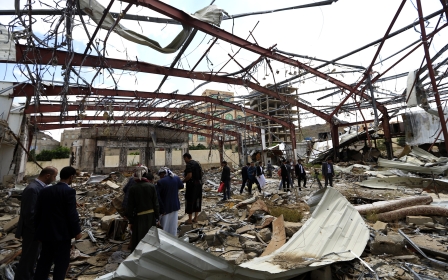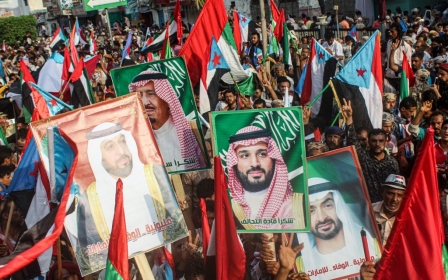Yemeni government signs Saudi-brokered deal with separatists to end southern conflict

Yemen's internationally recognised government and southern separatists signed a Saudi-brokered agreement on Tuesday to end their power struggle in the war-torn country.
"This agreement will open a new period of stability in Yemen. The kingdom of Saudi Arabia stands with you," Saudi Crown Prince Mohamed bin Salman said at a signing ceremony in Riyadh aired on state television.
"It's a joyful day in Saudi as the two sides come together."
The agreement calls for a government reshuffle to include the separatists and place their forces under President Abd Rabbuh Mansour Hadi's control, sources familiar with the talks told Reuters last month.
New MEE newsletter: Jerusalem Dispatch
Sign up to get the latest insights and analysis on Israel-Palestine, alongside Turkey Unpacked and other MEE newsletters
The UAE-backed separatist Southern Transition Council (STC) is nominally allied to Hadi's Saudi-backed government, but the two sides fell out in August, with the separatists seizing control of Aden.
Hadi and STC leader Aidarous al-Zubaidi attended the ceremony on Tuesday.
Locals doubt a lasting deal
The deal has been met with a tepid reaction in Aden from locals jaded by the failures of previous deals and outright opposition from many of Hadi's supporters.
“This is another agreement that we can add to the history of Yemen but again
there is no guarantee of implementation and I do not believe it will be
implemented,” Aden resident Ra’afat Abdu told Middle East Eye.
“I am sure the supporters of the STC will not welcome the government again in
Aden and there may be disputes again in Aden so I hope that warring sides in
Aden work for peace.”
Farouq Mahmoud, an STC supporter in Aden, told MEE that he was happy that the STC was being recognised in the agreement but was less pleased by the return of Hadi's government.
"We will accept it because it was signed by the leader Aidrous,” said Mahmoud. “The agreement was almost between two governments and we got international recognition for the STC, which will facilitate other steps towards independence.”
Saudi Arabia has hosted indirect talks between the two sides in an attempt to rebuild the coalition fighting against the Houthi movement, which expelled Hadi's government from the capital Sanaa five years ago.
'The signing of this agreement is an important step for our collective efforts to advance a peaceful settlement to the conflict in Yemen'
- Martin Griffiths, UN envoy
The deal would see the STC handed a number of ministries, as well as the government's return to the southern city of Aden, according to official sources and reports in Saudi media.
The so-called Security Belt Forces militia, trained by the UAE and dominated by the STC, in August took control of Aden, which had served as the beleaguered government's base since it was ousted from the capital.
The clashes between separatists and government forces, who for years fought on the same side against the Houthis, had raised fears that the country could break apart entirely.
Hadi's supporters are unhappy however at the concessions made to the STC, who they view as usurpers against the Yemeni government, comparing the agreement to failed deals made with the Iran-backed Houthi militias.
“The so-called STC has a militia in the south and it led a coup against the
government, so they should be subjected to trial. It is a big mistake by the
government to sign an agreement with the militia,” Ala’a al-Hammadi, a Hadi supporter in Taiz, told MEE.
“The government rewarded the STC with this step and they did not learn from
the agreements that were signed with the Houthis."
The UN special envoy for Yemen, Martin Griffiths, congratulated the two sides on the deal which he said would propel efforts to end the wider civil war that has devastated the country.
"The signing of this agreement is an important step for our collective efforts to advance a peaceful settlement to the conflict in Yemen," he said in a statement.
"Listening to southern stakeholders is important to the political efforts to achieve peace in the country."
Middle East Eye delivers independent and unrivalled coverage and analysis of the Middle East, North Africa and beyond. To learn more about republishing this content and the associated fees, please fill out this form. More about MEE can be found here.




